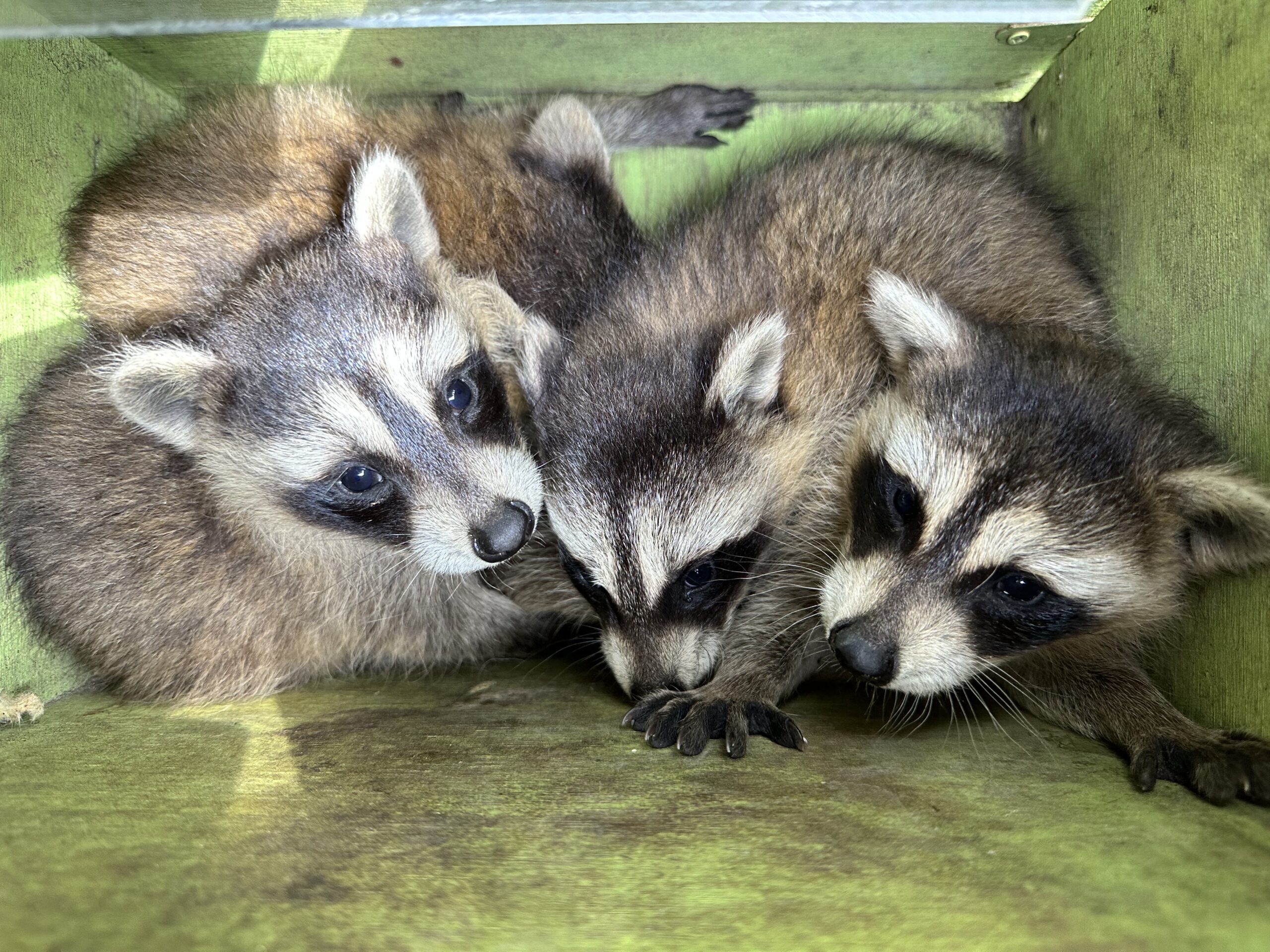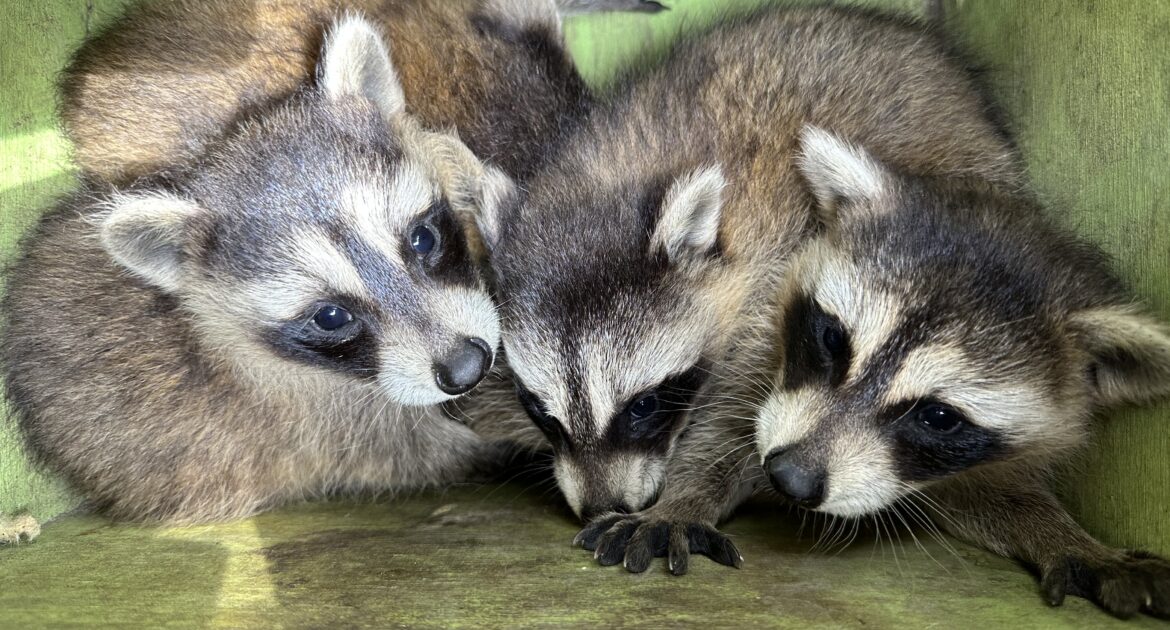Raccoons are fascinating creatures, often spotted wandering around in the darkness, leaving city dwellers in awe of their nocturnal antics. But with these shadowy creatures come a series of questions: Are raccoons dangerous? Do raccoons attack humans? These masked bandits tend to evoke myths and fears, particularly when they make themselves cozy in your urban backyard and attic.
Rest assured, direct confrontations with raccoons are quite rare. These intelligent, adaptable animals are not inherently aggressive towards humans. Instead, raccoons tend to mind their own business, scavenging for food scraps and seeking out warm nesting spots. Understanding their behaviour is key to harmonious coexistence. By recognizing their habits and setting simple deterrents, such as securing trash cans and avoiding feeding, residents can effectively keep raccoons at bay.
Throughout this exploration of raccoon behaviour, we’ll shine a spotlight on Mississauga’s own Skedaddle Humane Wildlife Control, which is an expert in fostering safe interactions between humans and wildlife. Learn how to maintain peace in your neighbourhood while safeguarding your home against these curious creatures.
Typical Behavior of Raccoons Around Humans
Raccoons are naturally inclined to be elusive. These nocturnal mammals prefer the cover of darkness, venturing out when most of us are asleep. They thrive at night, using their keen senses to explore urban landscapes quietly. Their shy nature means they generally avoid direct contact with people, opting instead for the shadows and secluded areas.
Despite their growing presence in urban environments, raccoons maintain a certain distance from human activity. They are curious but cautious creatures, observing from afar rather than engaging directly. This behaviour underscores their desire to coexist without confrontation, making them more of an intriguing neighbour than a threat.
Mississauga’s abundance of food sources can attract raccoons to residential areas. Trash bins, pet food bowls, and garden produce offer tempting meals for these opportunistic eaters. Despite their proximity to humans, raccoons rarely initiate direct interactions unless they stumble upon easily accessible food.
Raccoons’ adaptability allows them to thrive in various settings, but this does not equate to aggression towards humans. When their search for food leads them close to your home, they remain more focused on the meal than on engaging with us. Ensuring secured food sources can help minimize their visits, promoting a peaceful coexistence.
Situations When Raccoons May Show Aggression
While raccoons are generally elusive and non-aggressive, there are specific circumstances under which their behaviour can change. Understanding these situations can help homeowners maintain a safe distance and foster peaceful coexistence with these wild creatures. Here are a few scenarios where raccoons may display defensive behaviour:
- Feeling Threatened or Cornered: If a raccoon feels trapped, it might resort to defensive measures such as hissing, growling, or, in rare cases, swiping with its front paws. To avoid such encounters, ensure that escape routes remain open for raccoons and avoid approaching them if they seem agitated.
- Protecting Offspring: Mother raccoons are extremely protective of their young and may act aggressively if a human gets too close to their den. During the spring and early summer, when young raccoons are most vulnerable, it’s wise to steer clear of potential nesting sites. If a raccoon mother is spotted with her young, it’s best to give them plenty of space.
- Sick or Injured Raccoons: Like any animal, raccoons can become sick or injured. In such cases, they may show unusual behaviour and act unpredictably. If you come across a raccoon that appears ill or hurt, do not approach it and instead contact your local wildlife control service for assistance.
Understanding these scenarios can help prevent potential conflicts between humans and raccoons. By giving these creatures the space and respect they deserve, we can coexist peacefully and safely.
Raccoons and Rabies Concerns
Rabies is a concern when discussing the potential danger posed by raccoons. A rabid raccoon may display abnormal behaviour, such as daytime activity, disorientation, or unprovoked aggression. These signs indicate the disease and highlight the need for caution.
If you spot a raccoon exhibiting such symptoms, it’s vital to avoid interaction and seek professional assistance. Rabid animals pose a significant risk not only to humans but also to other creatures. Being aware of these signs contributes to public safety and helps manage potential health threats.
To protect yourself and your family, it’s crucial to understand the precautions necessary when encountering a potentially rabid raccoon. Avoid close contact, and refrain from attempting to assist or capture the animal. Instead, contact wildlife experts who can handle these situations safely.
By recognizing the signs of rabies and maintaining a safe distance, you contribute to both personal and community safety. Education on these matters empowers us to make informed decisions, reducing the likelihood of harmful encounters with infected raccoons.
Tips for Avoiding Negative Interactions with Raccoons
Ensuring peaceful coexistence requires simple adjustments to avoid unwanted raccoon interactions. By taking preventative measures, your home can remain a safe haven without the unexpected visit from curious creatures.
- Secure Trash Bins: Invest in sturdy garbage cans with tight-fitting lids to prevent raccoons from accessing leftovers. Consider using bungee cords or weights to bolster your defences.
- Remove Pet Food: Never leave pet food outdoors overnight. Bring both food and water bowls inside to eliminate a convenient food source.
- Maintain Clean Yards: Regularly clean up fallen fruits, nuts, or birdseed from your garden, which may attract raccoons searching for a meal.
- Restrict Entry Points: Inspect and seal potential entry points in your home, such as gaps in attics, chimneys, and basements, to deter these nocturnal explorers from seeking shelter.
- Install Motion-Activated Lights: Bright lights can startle raccoons and discourage them from approaching your property. Position these strategically around areas prone to visits.
By adjusting your surroundings using these strategies, you enhance the safety of your home and contribute positively to community wildlife management. Keeping a respectful distance and understanding their habits help maintain harmony between nature and urban living.
Enhancing Coexistence with Raccoons
In summary, while raccoons generally do not attack humans, they may act defensively if they feel threatened, especially when protecting their young or if they show signs of rabies. Understanding their behaviour is key to ensuring peaceful interactions.
For those in Mississauga seeking help in managing raccoon visits, Skedaddle Humane Wildlife Control offers safe, humane solutions to keep raccoons out of homes and properties. Their professional expertise ensures that raccoons are handled effectively and without harm.
If you’re concerned about potential raccoon interactions and want professional wildlife control assistance, contacting Skedaddle Humane Wildlife Control is a proactive step. They provide comprehensive services on how to keep raccoons away from your property.
To address questions like “do raccoons attack humans” or “are raccoons dangerous,” and to learn more about safeguarding your home, please contact us to request a quote and find out more about our services.




